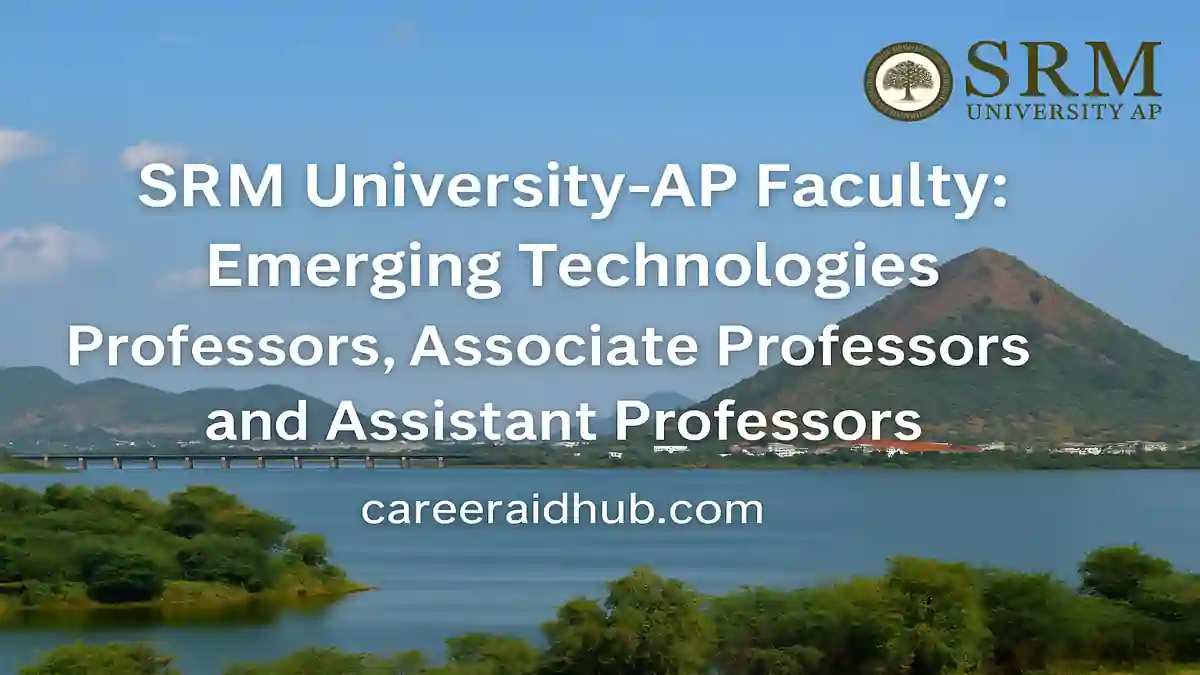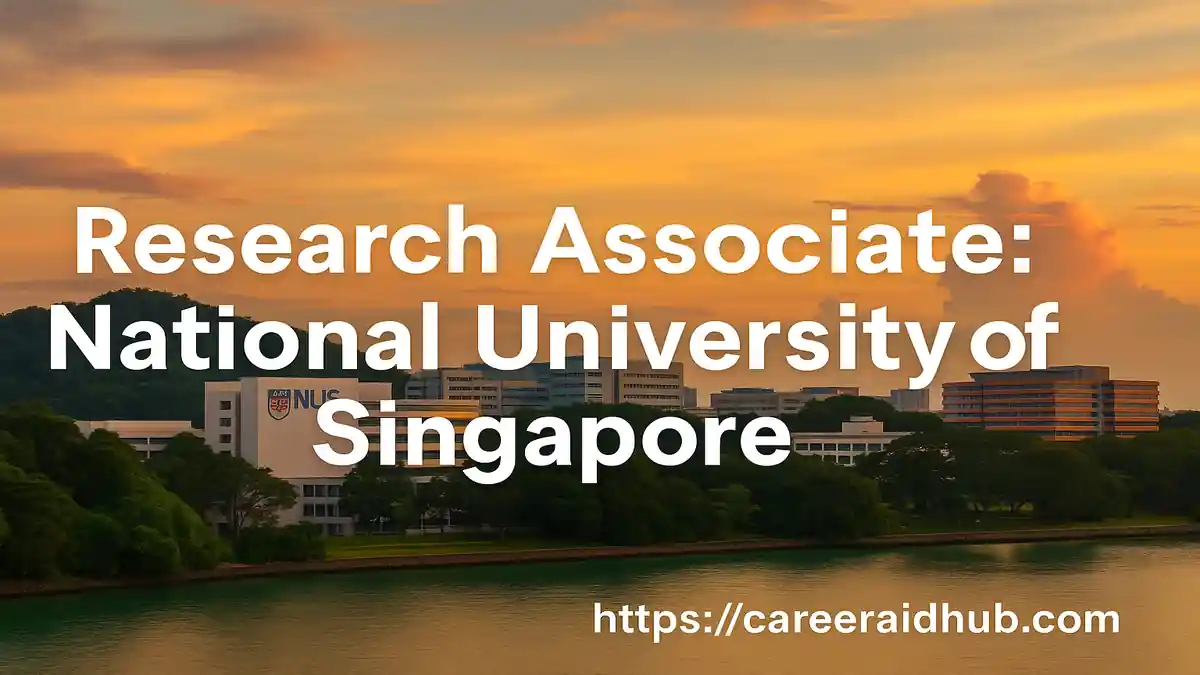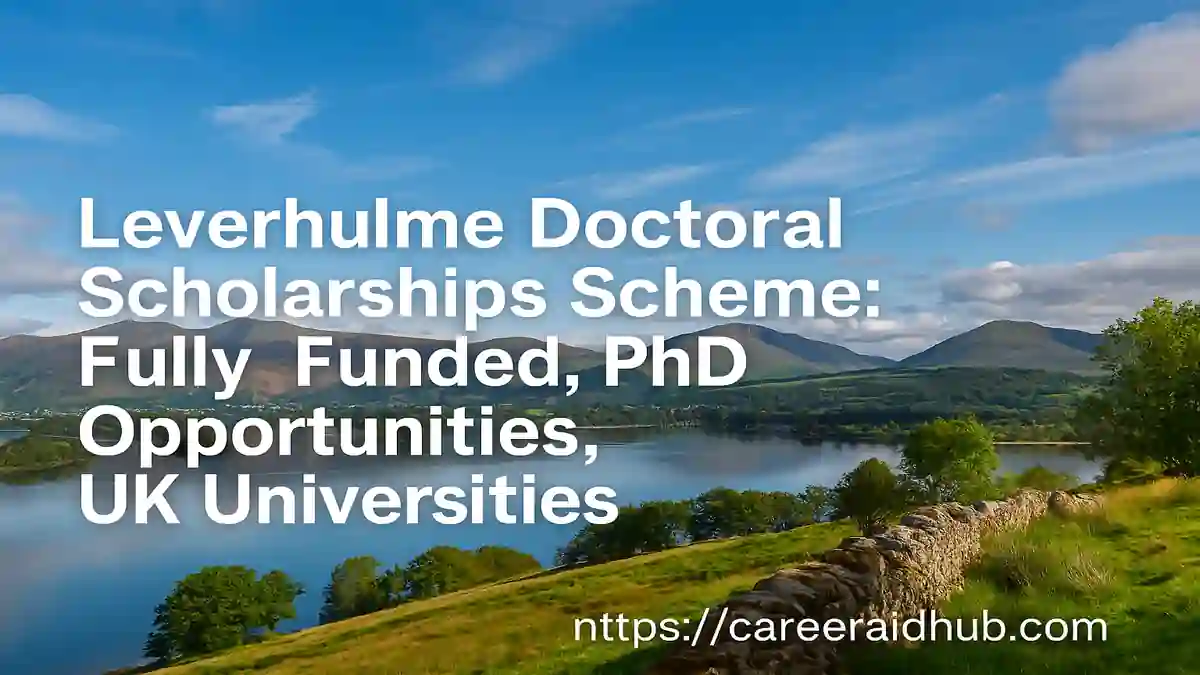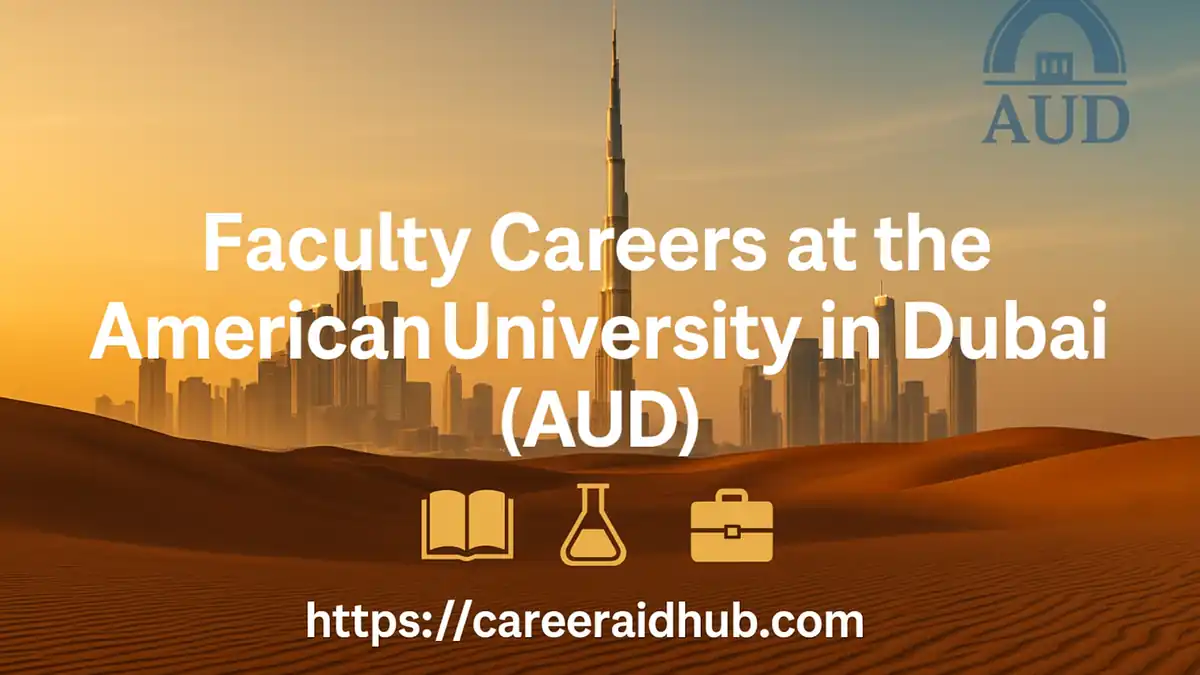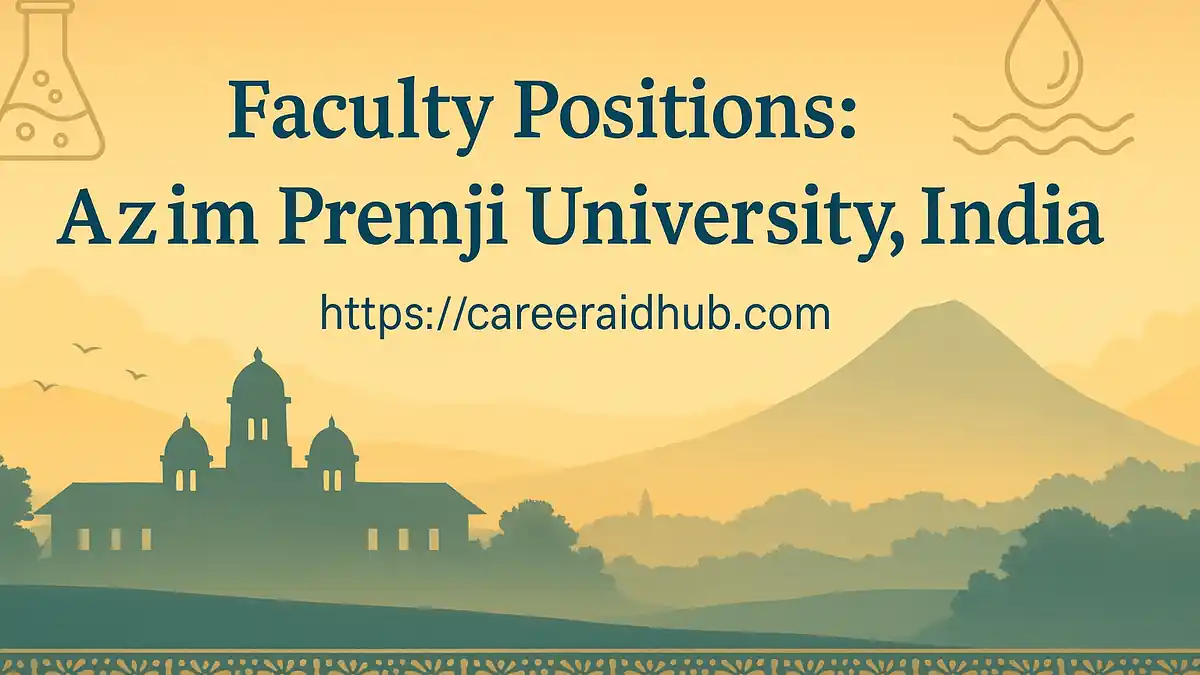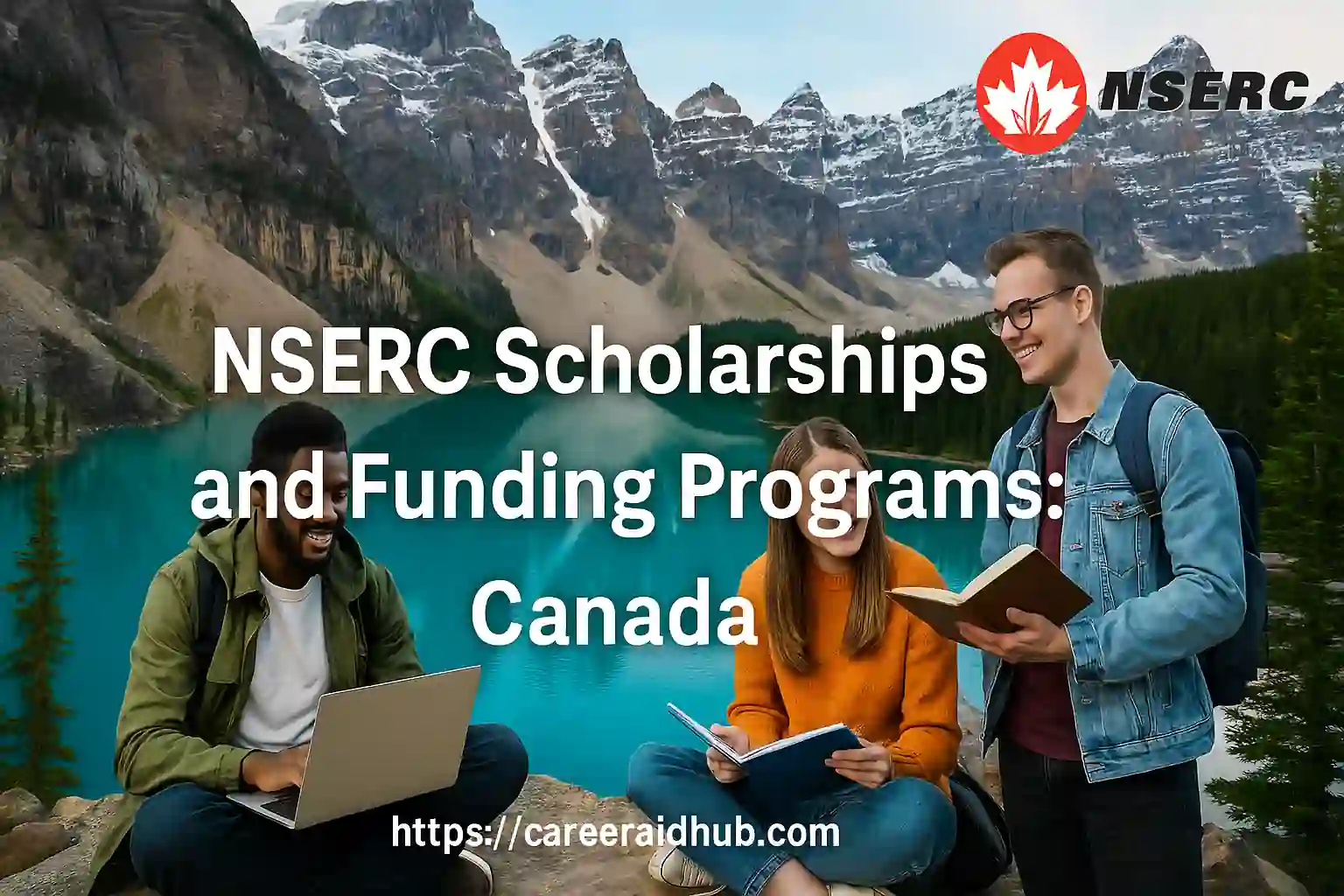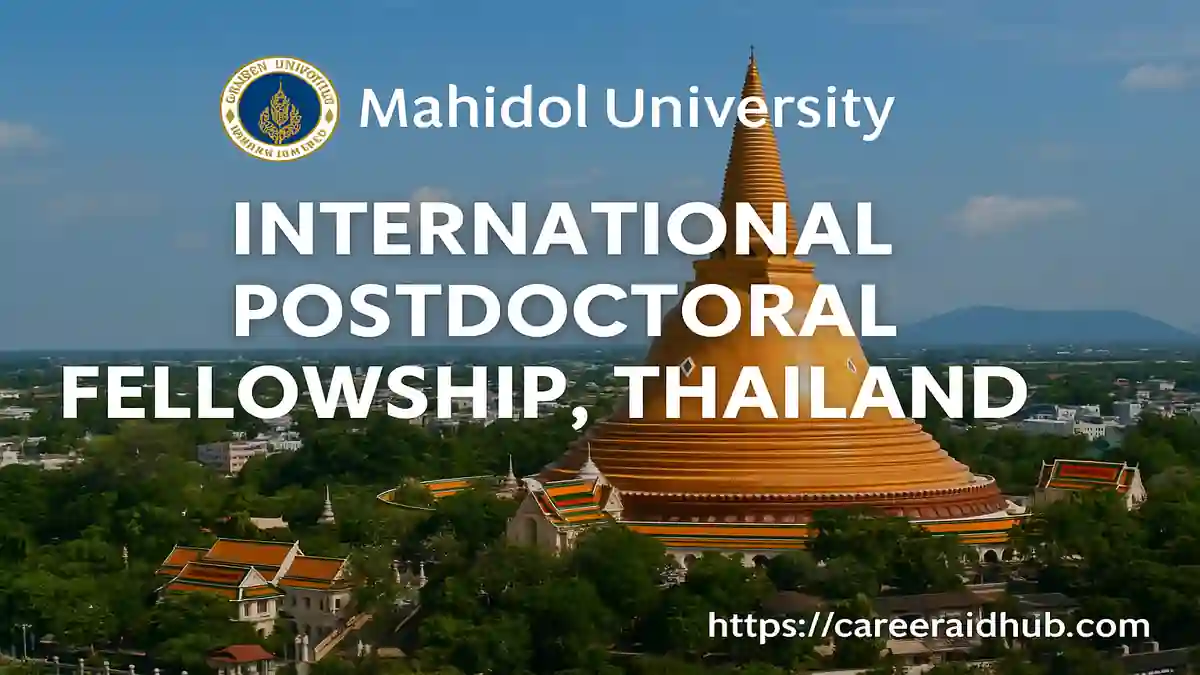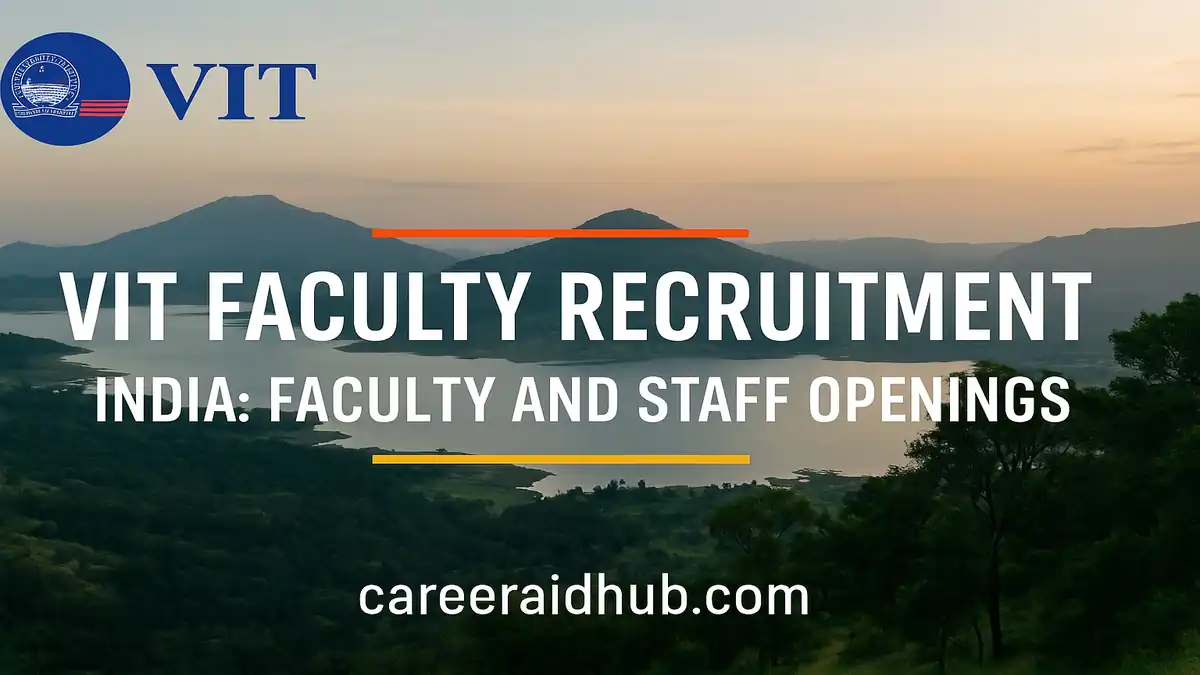SRM University-AP, Amaravati Faculty Positions in Emerging Technologies
SRM University-AP in Amaravati is a young yet ambitious institution that combines multi-disciplinary education with a strong research orientation. The university spans Engineering, Liberal Arts, Management and Entrepreneurship, and places particular emphasis on emerging domains that shape the future of work and society. As highlighted in the official university information, the institution actively seeks global-standard faculty to drive this vision forward [1].
These faculty openings in Emerging Technologies are therefore designed for academics who not only excel in research and teaching, but who also enjoy translating ideas into real-world solutions. The positions are ideal for scholars who wish to build laboratories, attract funding, collaborate with industry and mentor talented students within a supportive ecosystem.
SRM University-AP, Amaravati is recruiting outstanding academics as Professors, Associate Professors and Assistant Professors in cutting-edge areas of Emerging Technologies. With a strong research focus, generous funding, and a vibrant interdisciplinary ecosystem, the university offers an ideal environment to build a high-impact academic career while mentoring the next generation of innovators.
In what follows, this guide explains the thematic areas, eligibility criteria, salary and benefits, research ecosystem, and application process, while also offering practical tips to strengthen your application.
Reimagining the Future of Learning through Emerging Technologies
The Emerging Technologies initiative at SRM University-AP is more than a new set of programmes. It is a strategic
effort to rethink how technology education is delivered, how research questions are framed and how knowledge translates into societal impact.
Instead of restricting learning to classrooms, the initiative encourages students and faculty to co-create solutions to contemporary challenges. Projects often focus on energy transition, digital finance, defence technologies, semiconductor innovation and health engineering. Consequently, teaching is closely integrated with ongoing research, industry projects and start-up activity.
Moreover, the initiative explicitly promotes interdisciplinary collaboration. An energy engineering expert may work with economists on carbon markets, while a semiconductor researcher could co-supervise projects with neuroscientists on neuromorphic computing. This kind of cross-pollination allows faculty to position their work at the intersection of several high-impact domains, thereby increasing both academic visibility and practical relevance.
For incoming faculty, the initiative offers an opportunity to shape new curricula, launch specialised laboratories and participate in multi-institutional research networks. It is especially suitable for academics who enjoy working in teams and who are keen to see their research inform policy, industry practice or entrepreneurial ventures.
Areas of Specialisation in SRM University-AP Faculty Recruitment 2025
Faculty positions are open across several clearly defined domains of Emerging Technologies. Candidates are expected to demonstrate depth in their core specialisation while also showing openness to interdisciplinary work.
Energy Engineering – Decarbonising Future Energy Systems
style="text-align: justify;">Energy Engineering at SRM University-AP focuses on clean, resilient and intelligent energy systems. Faculty in this area can contribute to:
Sustainable Hydrogen Production and Utilisation – development of green hydrogen production routes, storage solutions and end-use applications in transport and industry.
Energy Analytics – data-driven optimisation of generation, distribution and consumption using advanced analytics and machine learning.
Energy Systems Modelling and Analysis – modelling complex integrated systems that combine renewables, storage and conventional sources.
Decarbonisation of Energy Systems – strategies to reduce emissions across value chains, including carbon capture, utilisation and storage.
Smart Grid and Microgrids – design and control of intelligent grids, local microgrids, and resilient energy infrastructure.
Faculty with experience in industry projects, policy engagement or demonstration pilots in these areas will find ample scope to continue and scale their work.
Defence System Engineering – Technology for Strategic Security
Defence System Engineering brings together aerospace, robotics, AI and cyber security. Key themes include:
Space Defence and Surveillance Systems – sensing, tracking and decision systems
for space situational awareness.AI-Powered Drone Technology and Warfare Systems – autonomous and semi-autonomous aerial platforms for surveillance and tactical missions.
AI-Integrated Cyber Defence Systems – intelligent cyber-defence tools, threat detection, and secure communication.
Materials and Armament Technology – advanced materials, ballistics, and design of protective systems.
Robotics and Mechatronic Systems – ground and underwater defence robotics, actuation and control.
Scholars with experience in defence laboratories, strategic research programmes or dual-use technologies can leverage SRM’s facilities to build impactful projects aligned with national priorities.
Financial Engineering – FinTech, Data and Computational Methods
The Financial Engineering cluster serves as a bridge between engineering, finance and data science. Core topics include:
Blockchain Technology – distributed ledger systems, smart contracts and decentralised finance applications.
Cloud Computing – scalable architectures for high-frequency trading, risk analytics and financial data storage.
Data Analytics – predictive modelling, risk assessment, and customer analytics for financial institutions.
Financial Technology (FinTech) Applications – payment systems, digital banking, robo-advisory platforms and regulatory technology.
Quantitative and Computational Methods – pricing models, optimisation, stochastic processes and numerical techniques.
This area is particularly attractive for faculty who collaborate with banks, fintech start-ups, regulators or policy think-tanks.
Semiconductor Technologies – Devices, Circuits
and ArchitecturesSemiconductor Technologies form the backbone of modern electronics. At SRM University-AP, faculty may work on:
Nano Device and Sensor Fabrication Technologies – design, fabrication and characterisation of advanced devices and sensors.
Memory and NVM Technologies – novel memory architectures and non-volatile memory systems.
Analog and Mixed Signal IC Design – integrated circuits for communication, sensing and signal processing.
Digital Circuits and Architectures – high-performance digital systems and energy-efficient architectures.
Neuromorphic and Quantum Computing Technologies – unconventional computing paradigms and their hardware implementations.
Circuits and Architectures – cross-layer co-design spanning device, circuit and system levels.
Faculty with experience in state-of-the-art cleanroom work, EDA tools, and industry collaborations will find strong institutional support for establishing cutting-edge labs.
Health Engineering – Bridging Technology and Life Sciences
Health Engineering blends engineering principles with medical and biological sciences. Major focus areas include:
Biomechanics – modelling of human movement, prosthetic design and rehabilitation technologies.
Tissue Engineering – biomaterials, scaffolds and regenerative medicine approaches.
Drug Dynamics – pharmacokinetics, pharmacodynamics and drug delivery systems.
Biomedical Imaging – imaging algorithms, instrumentation and image-guided interventions.
Synthetic Biology – engineered biological systems and biosensors.
Interdisciplinary collaboration with clinicians, hospitals and biotechnology firms is strongly encouraged, enabling faculty to translate research into improved health outcomes.
Interdisciplinary Profiles
Candidates whose work cuts across two or more of the above domains—such as hydrogen-based propulsion systems, blockchain-enabled energy trading, or AI-driven medical imaging—are particularly welcome. Interdisciplinary portfolios often lead to cross-cutting courses, joint supervision and high-impact publications.
Eligibility Criteria for Professor, Associate Professor and Assistant Professor
Applicants must possess a Ph.D. in a relevant discipline from reputed institutions such as IITs, IIMs, Central Universities or top QS-ranked international universities. However, eligibility is not limited to the degree alone.
The university also looks for:
A strong publication record in reputable journals and conferences, ideally with Q1/Q2 outputs.
Evidence of having secured external research funding, industrial grants or consultancy projects.
Demonstrated teaching effectiveness, including curriculum development, innovative pedagogy and mentoring of students.
Contributions to patents, technology transfer, standards or policy documents where applicable.
Commitment to academic ethics, diversity, and a collaborative institutional culture.
While senior appointments will require significant post-Ph.D. experience, early-career researchers with exceptional potential and postdoctoral experience are also encouraged to apply.
Attractive Compensation and Research Support at SRM University-AP
Competitive Salary Structure
SRM University-AP offers a compensation structure that is comparable to leading global institutions, with a broad salary range of ₹12 Lakhs to ₹40 Lakhs per annum, depending on rank, experience and achievements. Importantly, the university emphasises that there are no rigid salary caps for truly outstanding profiles.
This flexibility allows the institution to match or exceed competing offers, thereby attracting top talent from India and abroad. In addition, performance-based increments and promotion pathways reward sustained excellence in teaching, research and service.
Research Funding, Seed Grants and Professional Development
To help faculty build robust research programmes, SRM University-AP provides:
Research seed grants up to ₹50,00,000, which can be used for equipment, consumables, staff and collaborative activities.
An Annual Professional Development Allowance of ₹1,00,000 for conference travel, workshops, specialised training and professional memberships.
Institutional support for national and international grant applications, including proposal review, budgeting assistance and administrative backing.
These mechanisms enable faculty to move quickly from conceptualising new ideas to executing funded projects and building research teams.
Innovation, Technology Transfer and Entrepreneurship Ecosystem
A defining strength of SRM University-AP is its emphasis on innovation and technology transfer. The university operates a dedicated Technology Transfer Cell that provides:
Financial and legal support for patent filing and protection.
Assistance in negotiating licensing and technology transfer agreements with industry partners.
Access to incubation facilities and mentoring for faculty and student start-ups.
Furthermore, the ecosystem encourages spin-off companies and entrepreneurial ventures that emerge from academic research. Faculty can also engage in executive education programmes and industrial consultancy, which offer both additional revenue and valuable insight into real-world challenges.
This integrated approach ensures that research outcomes travel beyond academic journals and contribute tangibly to industry and society.
Academic Environment, Mentoring and Student Engagement
Building Research Groups and Supervising Scholars
Faculty members at SRM University-AP are expected to mentor post-doctoral scholars and Ph.D. students supported by university and external fellowships. This creates a layered research environment where undergraduates, postgraduates, doctoral candidates and postdocs collaborate on shared problems.
By leading such groups, faculty can develop long-term research agendas, publish consistently, and build reputations as thought leaders in their domains.
Teaching, Curriculum Design and Interdisciplinary Collaboration
Teaching loads are structured to allow meaningful time for research, yet they remain central to the faculty role. Academics are encouraged to design innovative courses, project-based modules and interdisciplinary electives that connect emerging technologies with societal needs.
Collaboration across schools—Engineering, Sciences, Management and Liberal Arts—is strongly supported. Joint supervision, co-taught courses and shared labs help students develop a holistic understanding of technology and its broader implications.
Comprehensive Benefits and Work–Life Support
Beyond academic incentives, SRM University-AP offers a supportive work environment and comprehensive benefits package. Faculty members receive:
Mediclaim insurance of ₹5 Lakhs to cover health needs.
Term life insurance of ₹15 Lakhs for financial security.
Relocation and housing assistance, which significantly eases the transition for faculty moving to Amaravati and the surrounding region.
The modern campus, residential facilities and growing local technology ecosystem make it a conducive place for both professional growth and personal well-being.
How to Apply for SRM University-AP Faculty Positions
Prospective candidates are invited to submit their applications online through the official careers portal of SRM University-AP. Typically, an application will include:
A detailed curriculum vitae outlining education, employment history, publications, grants, patents and key achievements.
A statement of research detailing past work, current projects and future plans aligned with Emerging Technologies.
A teaching statement describing philosophy, experience and ideas for innovative courses.
Names and contact details of referees who can comment on research, teaching and professional conduct.
Any additional documents requested on the portal, such as key publications or evidence of industrial collaborations.
The current recruitment cycle specifies an application timeline culminating in November 2025, as indicated in the official advertisement. For planning purposes, applicants may expect future cycles to follow a similar window around November 2026, although exact dates will be confirmed once SRM University-AP releases its next call; this article will be updated accordingly.
For candidates exploring broader opportunities, it can also be useful to review related resources on faculty openings across India and abroad, such as your site’s dedicated page on faculty positions or guides to postdoctoral fellowships that help early-career researchers build strong profiles before applying.
Expert Tips to Strengthen Your Application
To make your application stand out, consider the following practical suggestions:
Align your research statement with SRM’s Emerging Technologies clusters. Explicitly show how your work contributes to energy transition, fintech, defence technologies, semiconductor innovation or health engineering.
Highlight measurable outcomes. Instead of listing publications alone, emphasise citation impact, grants won, patents filed or technologies transferred.
Demonstrate interdisciplinary work. Provide examples where you collaborated across departments or sectors, as this aligns with SRM’s institutional culture.
Showcase mentoring experience. Mention supervision of theses, project guidance and initiatives that supported student success.
Prepare for a research talk and teaching demonstration. Shortlisting often leads to campus or virtual visits where clear communication of ideas is crucial.
Such elements not only improve your chances in this particular recruitment round but also enhance your overall academic portfolio, making the article itself a useful resource for future applicants.
Review and Update Timelines
To keep this guide accurate and useful:
Last reviewed: August 2025
Next scheduled review: October 2025 or earlier, once SRM University-AP releases updated information for upcoming recruitment cycles.
Regular reviews ensure that salary ranges, benefits, deadlines and other key details remain aligned with official announcements.
Conclusion and Call to Action
SRM University-AP’s faculty recruitment in Emerging Technologies offers a rare combination of competitive compensation, generous research funding, strong institutional support and the freedom to shape new academic programmes. As the official communications emphasise, the university aims to build a world-class hub where teaching, research, innovation and entrepreneurship reinforce one another [2].
If you are passionate about advancing frontier technologies, eager to lead impactful research teams and committed to mentoring the next generation of engineers, scientists and entrepreneurs, these positions merit serious consideration. Prospective applicants are encouraged to review the official careers portal, prepare a carefully targeted application, and seize this opportunity to craft a long-term academic career at a dynamic, research-intensive institution in the heart of Andhra Pradesh.
Quick Summary Table
| Item | Details |
|---|
| University | SRM University-AP, Amaravati (Andhra Pradesh, India) |
| Positions | Professor, Associate Professor, Assistant Professor |
| Focus | Emerging Technologies |
| Major Areas | Energy Engineering, Defence System Engineering, Financial Engineering, Semiconductor Technologies, Health Engineering |
| Eligibility | PhD in relevant field from reputed national institutes or top QS-ranked international universities |
| Key Requirements | Strong publications, research potential, teaching experience, interest in innovation and interdisciplinary work |
| Salary Range | Approx. ₹12–40 LPA (flexible for outstanding candidates) |
| Research Support | Seed grants up to ₹50,00,000; Annual Professional Development Allowance of ₹1,00,000 |
| Other Benefits | Health insurance, term life cover, relocation and housing support |
| Innovation Ecosystem | Technology Transfer Cell, patent support, start-up incubation, consultancy and executive education |
| Student Mentoring | Supervision of PhD scholars, post-doctoral fellows and project students |
| Application Mode | Online via SRM University-AP careers portal |
| Current Cycle | Apply by 23 November |
| Contact for Queries | Directorate of HR (phone/email as per official advertisement) |
References
[1] SRM University-AP Official Website
[2] SRM University-AP Careers Portal
Frequently Asked Questions
What are the eligibility criteria for SRM University-AP faculty positions in Emerging Technologies?Applicants must hold a relevant PhD, show strong peer-reviewed publications, demonstrate effective teaching, and also align their research with energy, defence, fintech, semiconductor or health engineering focus areas.
How can I apply for SRM University-AP faculty recruitment in Emerging Technologies?Candidates apply through the SRM University-AP careers portal, then upload CV, research and teaching statements, references and, finally, track application status via email from HR.
What research experience does SRM University-AP expect from new faculty hires?The university expects evidence of independent research, including quality journal papers, conference publications, successful grant applications and, additionally, potential for patents or technology transfer outcomes.
What are the salary and benefits for SRM University-AP Emerging Technologies faculty roles?Selected faculty receive competitive salaries, plus health insurance, term life cover, relocation assistance and, moreover, access to research seed grants and annual professional development allowances.
Are international candidates eligible to apply for SRM University-AP faculty openings in Emerging Technologies?International and diaspora scholars may apply.
What teaching responsibilities do faculty in Emerging Technologies typically handle at SRM University-AP?Faculty design and deliver undergraduate and postgraduate courses, supervise projects and theses, mentor students and, also, continuously update curricula to reflect evolving technological trends.
What relocation and housing support does SRM University-AP offer newly appointed faculty?New faculty usually receive assistance with relocation logistics, temporary accommodation and, furthermore, guidance on securing suitable long-term housing near the Amaravati campus.
How can I strengthen my application for SRM University-AP faculty recruitment in Emerging Technologies?Highlight impactful publications, secured grants, industry collaborations, innovative teaching practices and, importantly, a clear research vision aligned with SRM University-AP’s Emerging Technologies clusters.

